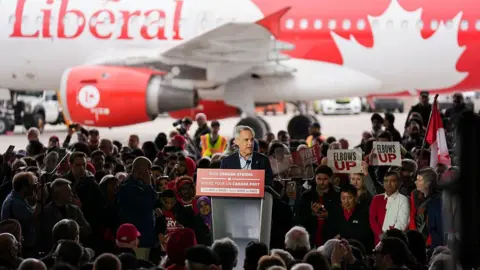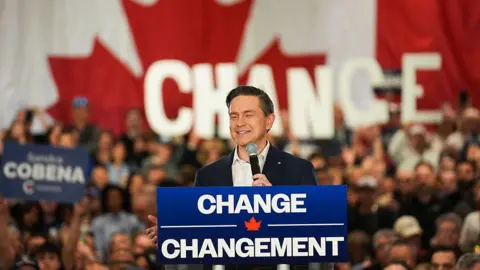Nadine Yousif
BBC News
Reporting fromOttawa
Watch: What Canadians really care about - beyond the noise of Trump
Canadians will cast their ballots on Monday in a pivotal election that has been completely transformed by US President Donald Trump.
The Conservatives appeared certain to win any contest by a landslide at the start of the year, until Trump's tariffs and barbs about making Canada the "51st state" upended the country's politics and injected fresh life into Mark Carney's Liberal Party.
The final polls suggest the Liberals are slightly ahead, although the race has tightened in the past week and Conservative leader Pierre Poilievre says his party can win.
The 36-day campaign ended on a sombre note as party leaders responded to the Saturday evening car ramming that killed 11 people in Vancouver.
- Community in shock after Vancouver car ramming attack
- What we know about the Vancouver car ramming attack
Carney, the incumbent prime minister, cancelled a stop in Hamilton on Sunday morning to address the nation following the attack, which saw an SUV ram into a crowd gathered for a local Filipino festival.
Poilievre, meanwhile, added a campaign stop in Mississauga, a Toronto suburb, to speak with members of the Filipino community there.
Later in the day, Carney held a spree of events in three provinces - Saskatchewan, Alberta and British Columbia - in a final push to get out the vote in western Canada, where the Conservatives have more support.
Trump's decision to impose 25% tariffs on America's northern neighbour and his repeated threats to annex the country as the "51st state" fanned deep anger as well as feelings of Canadian nationalism. It led hockey fans to boo the US national anthem before games, a sign of just how suddenly decades of stable US-Canada relations had been shaken.
The US president came to dominate on the campaign trail, with the contest being viewed by many as a referendum on how Canada should approach the man fresh into his second term in the White House.
During campaign stops, Carney, 60, often spoke of the need to counter an existential threat from President Trump, who he said was "trying to break us so the US can own us".
He positioned himself as best fit to lead the country through the present crisis, leaning on his experience as the former central banker for Canada during the Great Recession and for the UK at the Bank of England during Brexit.
At a campaign stop in Saskatoon on Sunday, Carney said Canada should strengthen its ties with other "reliable trade partners" like the UK and the European Union. Earlier in the election, he said the old relationship that Canada had enjoyed with the US for decades was "over".



 Getty Images
Getty Images
Carney campaigned in three different provinces on Sunday in a final push to get the vote out

 Getty Images
Getty Images
Poilievre has billed himself as the change candidate for those who want an end to Liberal rule in Canada
Meanwhile, Conservative leader Poilievre made his final stops in Ontario where polls indicate his party is trailing behind. The populous province is home to 122 seats in Parliament out of 343 that could alter the outcome of the election. A party must win 172 seats to have a majority government. The Liberals currently hold 152 seats, the most of any party, but they would have to pick up a significant number of seats to control the House of Commons.
Much of Poilievre's messaging has centred on what he has called the "lost Liberal decade" under the leadership of former Prime Minister Justin Trudeau, who stepped down earlier this year when his party was ailing in the polls.
The Conservative leader frequently drew upon frustrations with soaring housing costs, unaffordability and crime to pitch himself as the change that Canadians need.
"We need to vote for change so you can afford food and homes," he told supporters at a campaign stop in Peterborough, a city north-east of Toronto.
And with the election shaping up as a race between the Conservatives and the Liberals, smaller parties have struggled to gain traction.
The left-leaning New Democratic Party (NDP), led by Jagmeet Singh, faces the prospect of losing a number of seats as it trails behind the separatist Bloc Québécois, which runs candidates only in the French-speaking province of Quebec.
Singh cancelled a number of campaign events on Sunday in light of the deadly attack in Vancouver. The NDP leader, who is running for re-election in a Vancouver-area riding, was meeting supporters at the Lapu Lapu festival minutes before the attack. He appeared visibly emotional when he spoke to the media afterwards.
Throughout the election, Singh called on Canadians to vote for his party's candidates so they can act as a check on power in Ottawa.
The Bloc has also struggled, with fears over Trump's threats and Canada's future fuelling anxiety throughout the country and pushing voters towards the bigger federal parties.
Historically, Canada has only been led by Liberal or Conservative governments.
While President Trump has been a central figure to Canada's election, he has steered clear of commenting on its outcome.
But the Trump administration has continued its rhetoric on taking over Canada. US Secretary of State Marco Rubio told NBC's Meet the Press on Sunday that "the president has stated repeatedly he thinks Canada would be better off as a state".
Polls will open at 08:30 local time on Monday in Newfoundland and Labrador (12:00 GMT). The election will span across six time zones, with the last polls closing in British Columbia at 19:00 PST (03:00 GMT on Tuesday).
A record number of Canadians - more than 7 million - have already cast their ballots in advance.

 1 month ago
16
1 month ago
16









 English (US) ·
English (US) ·